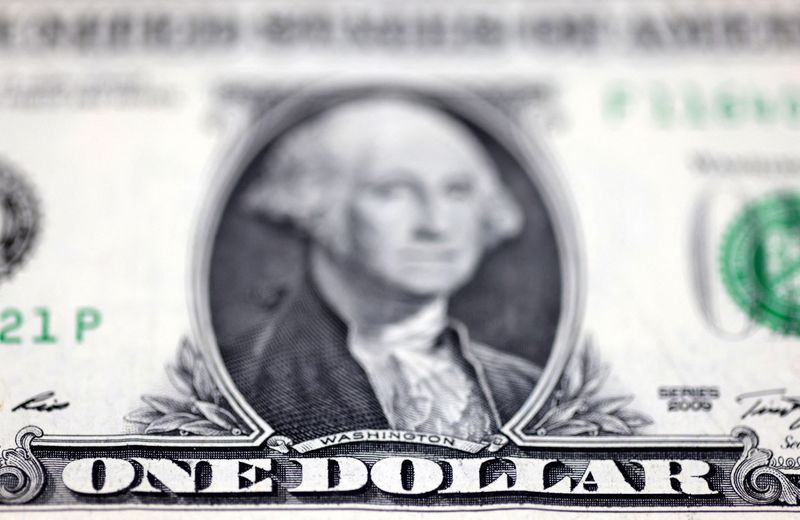 © Reuters. FILE PHOTO: U.S. Dollar banknote is seen in this illustration taken July 17, 2022. REUTERS/Dado Ruvic/Illustration/File Photo
© Reuters. FILE PHOTO: U.S. Dollar banknote is seen in this illustration taken July 17, 2022. REUTERS/Dado Ruvic/Illustration/File Photo
By Saqib Iqbal Ahmed
NEW YORK (Reuters) - A stronger-than-expected U.S. economy is buoying the dollar, frustrating investors who had bet the currency would wilt under a barrage of interest rate cuts that have yet to materialize.
The dollar index, which measures the buck against a basket of its peers, is up 2.4% year-to-date. Net bets on the dollar in futures markets swung positive last month for the first time since late November, Commodity Futures Trading Commission data showed.
Driving the U.S. currency's stubborn strength is a robust U.S. economy that has made the Fed hesitant to ease monetary policy too quickly and risk an inflationary rebound.
U.S. gross domestic product grew at a 3.2% annualized rate in the fourth quarter. By contrast, the eurozone's economy stagnated last year, China faces a deepening property crisis, and Japan unexpectedly slipped into recession at the end of 2023.
While the U.S. economy has remained resilient, "there is no significant evidence Europe and China are picking up," said Thierry Wizman, global FX and rates strategist at Macquarie, who has become more neutral on the dollar after his bearish outlook last year. "That's the reason people have had this change of heart" on the dollar, he said.
The dollar's strength will be tested this week as investors brace for Fed Chairman Jerome Powell to testify before lawmakers on Wednesday and Thursday and await U.S. employment data at the end of the week. Signs that the Fed is sticking with its "higher for longer" messaging on rate cuts or that the U.S. economy continues to stay strong could support the dollar's rally.
Investors are pricing in some 85 basis points of rate cuts for 2024, compared to more than 150 basis points they had factored in early January, futures tied to the Fed's policy rate showed.
Among the dollar bulls is Ugo Lancioni, head of currency at Neuberger Berman, who is betting on the greenback to continue rising thanks to U.S. outperformance even though he believes it has grown expensive relative to other currencies.
"Our call right now is purely a relative growth type of call," he said.
Getting the dollar's trajectory right is important for investors, given the currency's central role in global finance.
A strong dollar could weigh on the outlook for U.S. multinationals as it makes it more expensive to convert their foreign profits into dollars, while also making exporters' products less competitive abroad. About a quarter of S&P 500 companies generate more than 50% of revenues outside the U.S., FactSet data showed.
Dollar strength could also complicate other central banks' efforts to fight inflation as it makes their currencies cheaper. The European Central Bank, which concludes its monetary policy meeting on Thursday, has also pushed back against rate cut talk due to sticky inflation. Signs that the euro zone's policymakers might further delay easing could boost the euro at the dollar's expense.
Strategists are still broadly bearish on the dollar, though the dollar's persistent strength is testing their outlook. While the median forecast among currency strategists is for the dollar to weaken over the rest of the year, some 80% believed there was a risk of the dollar exceeding their target, a Reuters poll showed in February.
Paul Mielczarski, head of macro strategy at Brandywine Global, sees the dollar's recent rebound as more of a "tactical rally as opposed to a change in the underlying trend overall."
Mielczarski is encouraged by nascent signs of improving growth outside the U.S., including strength in the global semiconductor cycle, which benefits currencies like the Korean won.
Others, however, see more reasons for dollar strength - especially if former U.S. President Donald Trump gains the upper hand in a presidential reelection race that has been deadlocked for months.
Analysts at Capital Economics wrote that Trump's proposed tariff increases could shift the Fed back to a tightening bias on monetary policy and set off a wider trade war that spurs safe haven demand for the U.S. currency. The dollar initially rallied after Trump won the 2016 election but fell 10.5% during his term.
While that may be far off, investors will still likely be hesitant to renew bearish bets against the greenback, Macquarie's Wizman said.
"I think it's a 'show me' story," he said. "The amount of skepticism on the part of traders is high."

